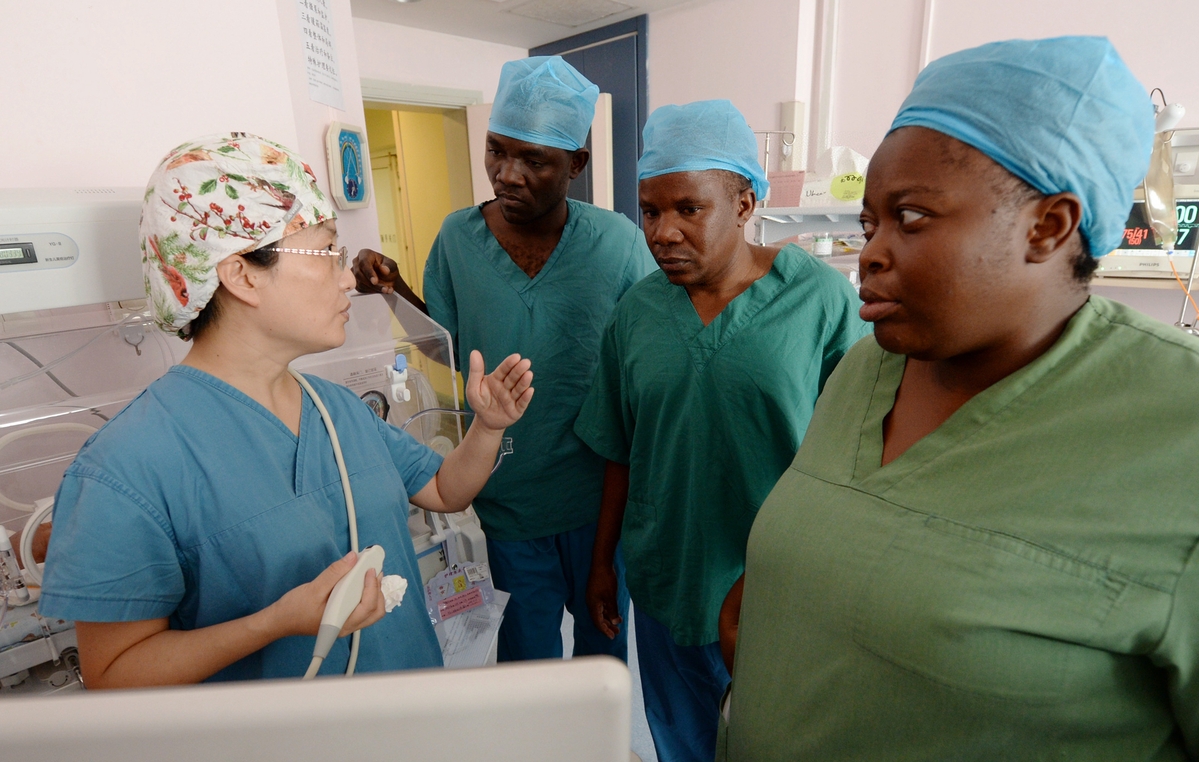China helps Malawi with tech training
In a bid to bridge Malawi's skills deficit, China is partnering with the African country's government to increase the number of technical training institutions in the country.
In a bid to bridge Malawi's skills deficit, China is partnering with the African country's government to increase the number of technical training institutions in the country.

Zhou Xihui, a doctor at First Affiliated Hospital of Xi'an Jiaotong University in Shaanxi province, shares examination techniques for newborns with Malawian doctors on August 28. The foreign physicians are taking part in a training project. [Photo/Xinhua]
This is in addition to a surge in scholarships offered to government employees to undertake short-term courses in China to share best practices and promote people-to-people exchanges.
According to Malawi's Ministry of Labour, Youth, Sports and Manpower Development, China's assistance has been transformative in the technical and entrepreneurial sectors.
"Besides an upsurge in bilateral trade and investment, we have seen assistance directed toward boosting skills to help meet emerging needs in the country," said ministry spokeswoman Christina Mkutumula.
Last year, China signed an agreement with the Malawian government to fund the construction of five new community colleges in Malawi's Mzimba, Ntcheu, Zomba, Nsanje and Mulanje districts. Besides construction of the colleges, more teachers will be trained to ensure young graduates have the skills needed to become entrepreneurs.
"Nearly half of Malawi's population is below the age of 15, and the Malawi government wants to see more graduates become interested in entrepreneurship and rely less on the few white-collar jobs generated in the job market," said Mkutumula.
Government data shows that each year, about 150,000 students graduate from secondary schools and less than 10 percent are admitted to tertiary education institutions.
Sazika Valo, deputy principal at Lilongwe Technical Institute, said partnership with China not only increases training opportunities, but the short-term workshops offered in China are boosting the skills of participants.
Valo said he visited Ningbo Polytechnic Vocational College in Zhejiang province four years ago for three weeks of leadership training. He was interested in how links between academia and the private sector, which he says are relatively weak in many African countries, have been developed and strengthened in China.
"Chinese technical colleges are well-advanced in industrial production. I believe the exchange programs will also bolster our efforts in strengthening engineering and science courses in our institutions," he said.
The vocational college, established 53 years ago, offers four main programs - engineering, automotive technology, construction and commerce.
Valo said China's manufacturing prowess was created by technical institutions emphasizing hands-on skills training. There is also deep interaction between industries and training institutions, especially in research and development, and this powers innovation.
"There is also a visible impact in the job market," said the deputy principal.
In Malawi, only 40 percent of graduates find employment in the current job market. This has prompted the government to develop policies to encourage fresh graduates entering the market to explore entrepreneurship opportunities and start their own businesses.
"We have come up with programs that give access to affordable credit" to young graduates, Valo said.
He added that the short-term training in China sharpened his managerial skills. He learned that building an all-inclusive partnership with his staff and students would ensure that goals are met. "Curricula also need to be reviewed regularly, with input from stakeholders encouraged. The life-span of a curriculum should be about three years."
He lauded the collaboration initiated by China, but said Africa is not effectively exploiting the opportunities being offered. "I think as a continent we can send more young people to study in China in technical programs. We need to take this initiative more seriously after first identifying our needs."
Innocent Banda, a junior government official who participated in the launch of the Belt and Road Alliance for Industry and Education Collaboration in June last year in China, hoped the partnership will boost Africa's efforts to hasten industrial growth, innovation and infrastructure, as well as encourage the development of clean, affordable energy.

